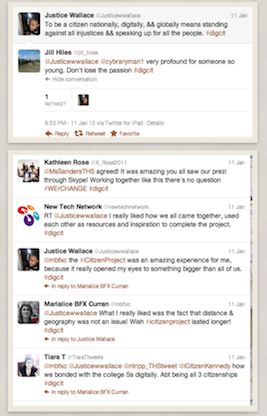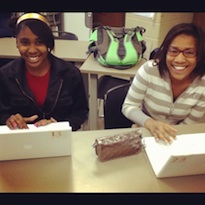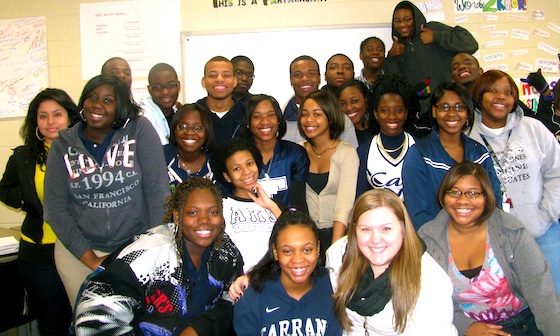What do citizenship, social justice, empathy, social networking and a high school classroom have to do with each other? In my classroom the answer is EVERYTHING. My mission is simple yet absolutely necessary to helping my students prepare for their futures.
Mission statement: Support my students to become not only informed but aware, not only aware but empathetic, not only empathetic but active, not only active but connected, not only connected but reflective and ready to create real life solutions to real life problems.
In a time when the global community is literally in our backyard, it becomes our duty (and privilege, I think) as educators to not only open the door to important questions and information but give our students access to tools and technologies that will help them connect to the global community, share their work, have relevant discussions, discover, learn, grow and develop. We need to help them become knowledgeable people, fitted out with the skills and tools they require to travel any path they choose to take outside of the classroom — and to cope with whatever they come across.
I began this school year with a list of questions that could help me envision, plan, reflect and maintain focus on where my students and I needed to be when the last bell rings in late May.
Some questions especially relevant to this post are:
– How can I ensure my students are gaining purposeful and relevant 21st century knowledge and skills every day?
– How can 20th century standards be adapted to support 21st century students?
– How can I embed empathy, adaptability, and problem solving into every class I teach?
– How can I create a global environment in my local classroom?
Out of my personal questioning and reflection came what would be the essential question for my 11th grade social studies students during our time together: What does it mean to be a citizen nationally, globally and digitally?
So we became iCitizens
To support my Tarrant (AL) High School students in pursuit of this question, we created and engaged in the iCitizenship project, a collaborative effort (with Dr. Marialice Curran’s freshman seminar at St. Joseph’s College) to create a variety of public service announcements (PSAs) in various media. Through this project, my soon-to-be-voters are helping inform many audiences about what a 21st century citizen is and how a 21st century person should practice citizenship in national, global and digital contexts.
 As students work to inform a larger, global audience about iCitizenship, they are simultaneously equipping themselves to be advocates and putting their definitions into action. It’s crucial that we help them understand the clear difference between the bare-bones qualifications to be a citizen and what it means to be an active, empathetic, aware person practicing citizenship. Then we need to support them as they work through the complexities of citizenship today from a school, city, state, regional, national, global and (increasingly important) digital or “connected” perspective.
As students work to inform a larger, global audience about iCitizenship, they are simultaneously equipping themselves to be advocates and putting their definitions into action. It’s crucial that we help them understand the clear difference between the bare-bones qualifications to be a citizen and what it means to be an active, empathetic, aware person practicing citizenship. Then we need to support them as they work through the complexities of citizenship today from a school, city, state, regional, national, global and (increasingly important) digital or “connected” perspective.
One thing often left out of state standards and curriculum is character building. Yet it’s a clear component of citizenship at every level. As a social studies teacher, it becomes nearly second nature for me to tie every lesson back to humanity, humility, civility, and right versus wrong. I know many other teachers (and not just in social studies) share this view. But because “character” is seldom a required learning target, it’s being left out of a lot of public school classrooms, creating serious problems.
Many students simply do not understand the who, what, when, where, why and how of citizenship. The iCitizenship project both supports students in understanding 21st century citizenship and creates opportunities for young adults to take ownership and practice it on multiple levels. My students skyped, tweeted, blogged and connected with people, young and old, from all over the world during this project.
They also facilitated and lead a twitter chat about iCitizenship and skyped into an iCitizenship Town Hall Meeting at St. Joseph’s College and engaged with a physical and virtual crowd of several hundred people. The event was also live streamed over the internet and generated nearly 1000 tweets.
My students gained a powerful awareness
My students were totally energized by the event. I could not get them to leave school or stop tweeting about it! They saw the changes they could make in people’s perceptions and understanding. And they realized how possible, even easy, it is to connect with people from anywhere and everywhere. They believed what they were doing was not only purposeful, it was necessary. They began to realize that they could literally “be the change they wished to see in the world.”
 I saw attitudes transform, heard critical ideas being voiced, and read the most thoughtful 140-character twitter speech bubbles I have ever seen. I saw passions being born right before my eyes because they not only were committed to the project, they believed in its ability to bring about positive change in themselves, their community, and yes even the world.
I saw attitudes transform, heard critical ideas being voiced, and read the most thoughtful 140-character twitter speech bubbles I have ever seen. I saw passions being born right before my eyes because they not only were committed to the project, they believed in its ability to bring about positive change in themselves, their community, and yes even the world.
Preparing our students to be active, empathetic, aware citizens and participants of our society is completely possible but we have to start making citizenship something that is embedded into every curriculum and classroom. If we don’t, we are going to continue seeing a generation of Americans who are not only disengaged from what goes on in the world around them but have no idea how to approach or solve problems that need the attention of active citizens.
The iCitizen project is proof that not only can students of today understand national, global and digital citizenship, they can embrace it, take ownership of it, and make it their personal mission to support and educate others to be upstanding national, global and digital citizens of today.
If that’s not the purpose of public schooling, then I don’t know what is.
I asked my students: “What would you ask other students and teachers after they learned about the iCitizen project?” They came up with three questions:
How do you promote citizenship in your classroom?
How are you and your students getting connected to the world to practice and promote 21st century citizenship?
What does being an iCitizen mean to you?
iCitizen Resources
My 90-second overview of the project
Our student products
http://mssandersths.posterous.com/are–you–an–icitizen–a–project–on–citizenship
Our Town Hall meeting



Wonderful piece, Beth. I’m proud to have interviewed you for our podcast. You are doing a great job for not only those kids, but the world of education. Really respect that! GailP
Gail, thanks so much for the support and kind words! It is amazing what a comment of encouragement can do for a person of the digital world! It is scary to put ourselves out there, but what type of iCitizen would I be if I didn’t share because of fear! Thanks again for the support and keep on keepin’ on!
Your posts are always reflective and inspirational. There are no walls in your mind, Ms. Sanders! As a teacher, I have to say that your guiding questions are ones I share too. I have a harder time acting on it because of fewer resources and low tech, but I strongly believe in the skills that are needed for 21st century learning. I think that citizenship in my classroom is promoted by depth and problem solving. I need to integrate a stronger message in empathy, however, and I look forward to planning more in that area in the future. I think an iCitizen to me is someone who goes boldly into the future knowing that the way has been prepared, as Maya Angelou says, by all who have come before. Your students are models of that future!
Nate, first off thanks for reading and for the generous words! I am literally astounded daily by the deep professional connections I have made through twitter and you my friend are a consistent reminder of the power of being connected!
I often wonder what role the resources play in supporting 21st century skills and learning? Are there often times you feel like your students could go further, think deeper if only they had the tools to make it happen? I often say I am an advocate for “technology equality” and truly do believe that technology resources must be a commonality in ALL of our schools before we can truly support our students to enter the ever digitizing and complexly connected world!
I love and connect with your stance that citizenship promotion comes from in depth problem solving. What better way to prepare our students then to practice the deep thinking and problem solving they are going to face on the outside inside of our classrooms!
Great iCitizen definition. It will be posted in my room Monday morning to begin our discussion…I also think the Angelou quote will make the board for words of the week!
Thanks again for your insight and support!
Beth,
The journey that you are taking your students on is so exciting. You are not only making learning interesting and relevant to them, but you are also exposing them to the power of thought, voice, connections, and power.
Last night, I heard Robert Putnam, the Harvard scholar who spoke of the decay of our real social network (people aren’t as active in clubs and civic endeavors as they once were). He left us with one very encouraging thought: The millenials seem to be wired to WANT to be more connected, to WANT to be more involved, to WANT to problem-solve.
Your students—and others across Alabama and the nation—can help us re-engage in meaningful ways that not only ensure the future of our democracy, but build real and virtual networks of people working together for good.
I’m developing a blog site and I was thinking of changing the template.Yours looks pretty nice! You could visit my site and tell me your viewpoint!
Fantastic piece, Beth! I remember your goals of setting out to do this when we talked last year at ISTE and no doubt, you set out on the path a blazin’. I’m glad you are able to share your experiences here. More people need to be aware of the amazing things you do… and more importantly, the amazing things of which your students have become capable and competent.
Beth,
That was truly an inspiring piece. Your students are active iCitizens and are living witnesses to the change you seek. I especially was interested in the empathy that you are fostering. That is a wonderful trait that they will use as they are active citizens when they leave your classroom. Thanks for sharing your powerful journey.
Honestly, the best part of this collaborative project was that it was completely student-driven. Not only did your students gain a powerful awareness, but they continue to share this view with others! It was a transformative experience for all those involved and personally I am so honored to have been a part of this journey! Your students have set the tone for our future and are leading by example! I can’t think of anything more powerful than this!